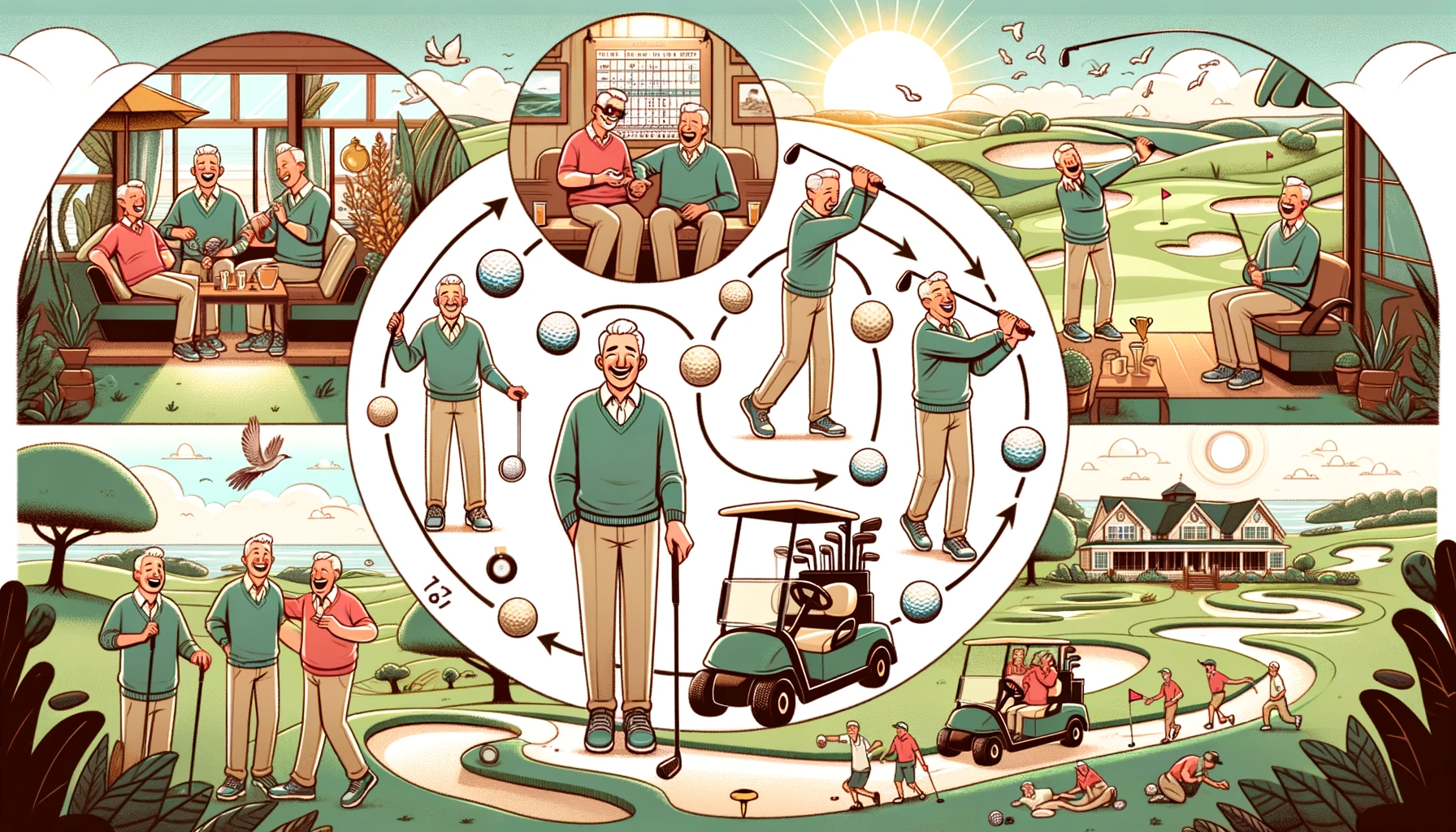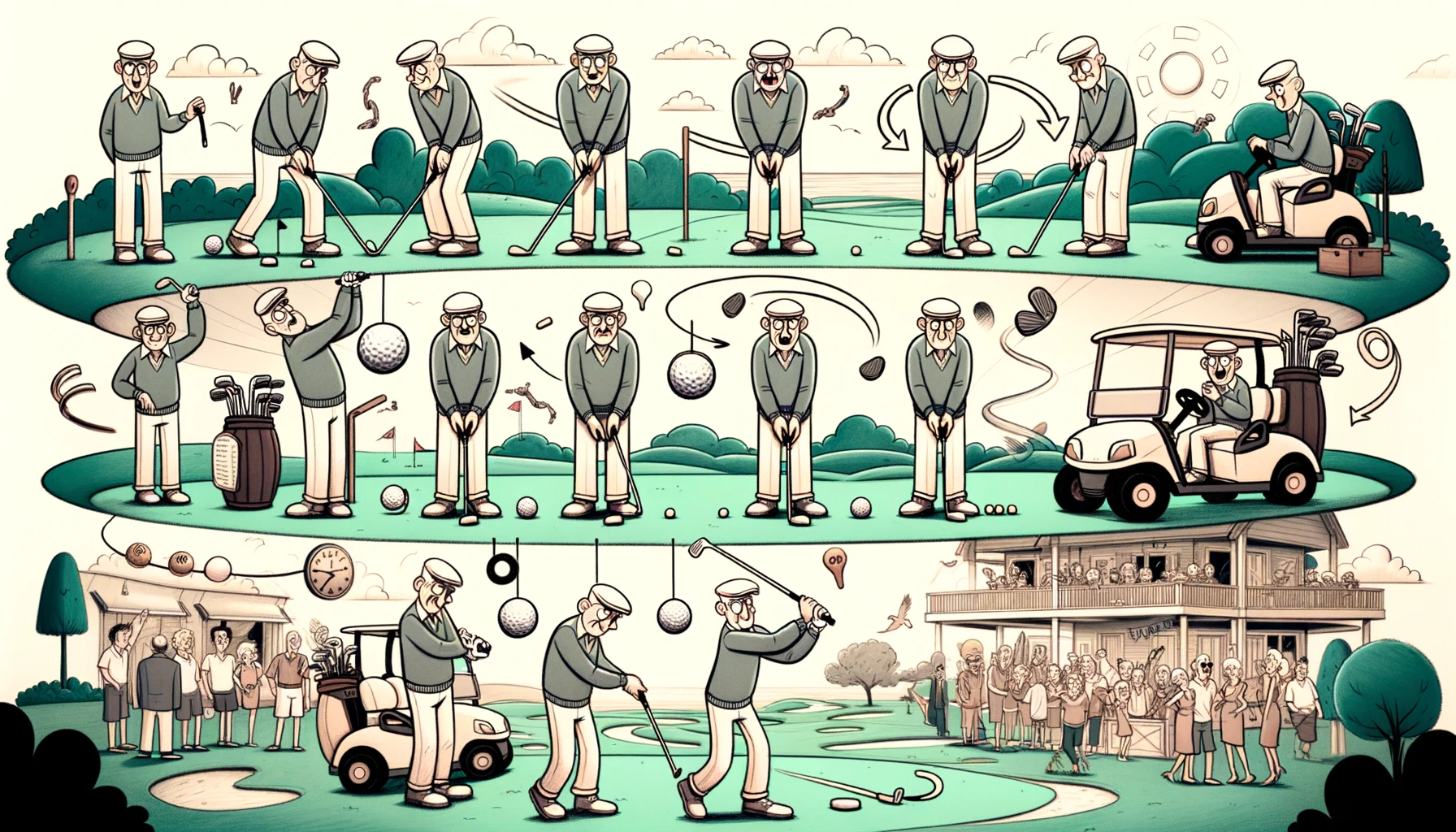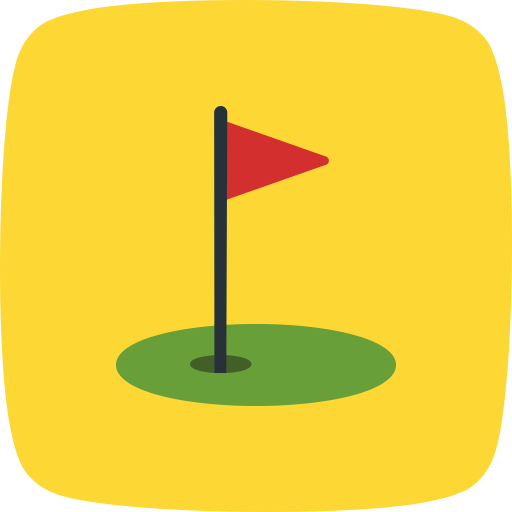- Home
- Equipment
- Golf Balls
- What Golf Balls Are the Best
Unlocking the Secrets of the Best Golf Balls: Performance, Preference, and Perfection
Struggling to find what golf balls are the best for your specific style and skill level? You're not alone. Our comprehensive guide demystifies this crucial choice, providing clear, actionable insights tailored to your unique needs. Don't miss our key takeaways and the FAQ section for quick, valuable nuggets of wisdom!
Dear golf enthusiast,
Do you ever feel overwhelmed by the sheer variety of golf balls available on the market? Each one promises to be the key to transforming your game, yet here you are, still searching for that perfect fit. It's a common struggle we face; the anxiety of choice, the fear of missing out on a better golf experience, and the confusion stemming from complicated technical jargon. But what if I told you that the secret to finding the best golf balls isn't just in the product but understanding what works specifically for you?
Now, imagine having the clarity to navigate this ocean of options, the confidence to know you're making the right choice, and the excitement of seeing real, tangible improvements in your game. That's what we're diving into today. We're not just talking specifications; we're exploring how different golf balls can affect your personal performance, whether high-end options are genuinely worth the investment, and ultimately, how to identify the ball that feels like it was made just for you.
So, are you ready to transform not just how you play, but how you choose your game tools? Are you prepared to step onto the green with a new sense of confidence, backed by insider knowledge most players wish they had? Then let's embark on this journey together, uncovering the truths and dispelling the myths, all with one goal in mind - elevating your game to heights you never thought possible. And remember, this isn't just about the golf balls; it's about setting you up for success, shot after perfect shot.
The Journey from Confusion to Mastery: Finding My Perfect Golf Ball
I remember the days when I'd walk the aisles of the sports store, bewildered by the array of golf balls before me. Each one boasted of superior aerodynamics, enhanced control, or increased distance. As a keen golfer eager to improve my game, I was drawn into this world of promises, believing that the "next big thing" would be my ticket to golfing prowess. But, oh, how that road was paved with trials and errors!
I recall one particular round - I had invested in what were marketed as top-tier, spin-controlled balls. My excitement was palpable; I was convinced I had an edge. Yet, as I took my swings, my shots were unpredictable, my control was off, and my confidence plummeted. It wasn't a skill issue; it was a compatibility problem. That's when I realized: there's no "one-size-fits-all" in golf balls. It's about what complements your unique style, swing speed, and skill level.
This epiphany was a game-changer. I dove into research, consulted experts, and most importantly, started to understand my playing style intimately. I tested balls, not based on brand prestige, but on how they felt on the course, how they responded to my club, my swing, my approach. It wasn't an overnight change; it required patience, an open mind, and a willingness to learn. But gradually, I found what worked for me - a ball that felt like an extension of my intentions on the green.
Now, golf isn't just a game I play; it's an experience I master. Knowing I have the right ball in my golf bag, I step onto the course with a quiet confidence, a deeper understanding of my game, and a profound connection with every swing I take. It's not just about lower scores; it's about the satisfaction of knowing I've taken control of my game, from the club to the ball, and everything in between.
And you, my friend, can experience this transformation, too. It's not about the fanciest tech or the most expensive balls; it's about finding your perfect match. Once you do, every course is an adventure, every shot a potential masterpiece. Because when you stop playing guesswork and start playing smart, golf becomes not just a sport, but a reflection of your dedication, personality, and growth.
Ready for the next step in our journey? Let's delve deeper into the specifics, shall we?
Unraveling the Mystery: What Makes a Golf Ball the 'Best' on the Market?
Ah, the age-old question that every golfer, including myself, has pondered endlessly: What makes a golf ball the 'best' on the market? Well, my friend, the journey to that answer is as intricate as the game of golf itself.
Firstly, let's talk construction. The 'best' golf balls typically have multiple layers, each serving a unique purpose. There's the core, the cover, and sometimes one or two layers in between. Each layer contributes to the ball's overall performance, affecting aspects such as distance, spin, and feel.
The Core: This is the heart of the ball, determining the power transfer from the swing. A high-quality core equates to efficient energy transfer, meaning longer distances on your drives.
The Cover: Here's where control comes into play. A softer cover allows better spin on greens, giving you that much-needed precision in your short game.
Now, let me share a little story. Once, I invested in a batch of "premium" three-layer golf balls, convinced they'd improve my game. Imagine my surprise when my drives started to stray and my control on the green became inconsistent. It was a nerve-shattering experience, to say the least. Later, I realized they were designed for players with a much faster swing speed than mine. Lesson learned: the 'best' ball isn't universally best for everyone; it's best for your specific style and speed.
Another crucial factor is the dimples. These tiny depressions on the surface are scientifically crafted to reduce drag and help the ball travel further and more accurately. The best balls have an optimized dimple design for stable flight.
But what about compression, you ask? Well, compression affects the feel of your shots. Lower compression balls are softer, making them easier to compress for players with slower swing speeds, like mine a few years back. Higher compression balls, however, offer more control, catering to players with faster swings.
The 'best' golf balls also provide:
Consistency: They perform reliably, shot after shot.
Durability: They withstand the rigors of the game without losing their integrity.
Innovation: They often feature the latest technology, offering an edge in one performance aspect or another.
In my quest for the 'best,' I've learned that it's not about chasing the brand that professionals use, but about understanding the nuances of my own game. I remember this one time when I was dragged, kicking and screaming, into a bet where I had to play with a random ball from my bag. It wasn't a brand I typically played with, but guess what? It worked wonders for my swing style, and I had one of my best games ever!
So, what's the takeaway here? The 'best' golf ball is the one that complements your individual play style, speed, and skill level. It's an extension of your equipment, a crucial piece of the puzzle in mastering the art of golf.
Now, having unraveled this, are you curious about how different brands stack up in real-world scenarios? Well, keep reading, because that's exactly where we're heading next!
The Game-Changer: How Do Different Golf Balls Affect My Game Performance?
If you're anything like me, you've probably spent countless hours on the course, perfecting your swing, only to realize that you've overlooked a silent game-changer: the golf ball itself. So, let's dive into the nitty-gritty of how different golf balls can significantly affect your game performance.
1. Distance: The construction of the golf ball can either be your ticket to the next level or a hidden anchor holding you back. High-energy cores combined with advanced aerodynamics can offer you those extra yards you've been craving. Remember, a ball with a harder core and optimized dimple pattern cuts through the air with less resistance, enhancing the distance.
2. Spin: Here's where the magic happens, especially around the greens. The softer cover of a premium ball can create more spin, giving you that stop-and-drop control that can save par or snag you a birdie. On the flip side, too much spin on your drives? You might be sacrificing distance and accuracy.
3. Feel: Ever hit a shot and just known it was perfect the moment it left the club? That's feel. A softer ball provides more feedback, helping you finesse your shots, especially in the short game.
4. Durability: No one wants to pull a scuffed ball out of their bag on the first tee. Balls with a harder cover might not provide the same level of spin or feel, but they'll take a beating and keep on competing.
Here's a quick breakdown to illustrate how different balls might affect your game:
Two-piece balls: Known for distance and durability. They're the go-to choice for beginners and those with a higher handicap. They have less spin, which can be quite forgiving if your shots aren't always straight as an arrow.
Multi-layer balls: The choice of most low-handicap and professional players. They offer a balance between distance, feel, and spin. However, they require a faster swing speed to truly shine.
In my journey, I've learned that the "best" ball for my game isn't just about brand or price. It's about honest self-reflection regarding my skills, what areas of my game need improvement, and what ball fits my current play style. I recall this one round where I switched to a less spin-focused ball, and the transformation was instant. My drives were longer, and I wasn't spinning off the green. It felt like I had discovered a secret weapon!
So, what's the bottom line? Experimentation is key. Don't be afraid to switch it up and try different balls under various conditions. You might just stumble upon a hidden gem that elevates your game to new heights.
And speaking of elevating your game, are you wondering if the price of a golf ball really reflects its performance? Let's tackle that next, shall we?
The Pricey Debate: Are Expensive Golf Balls Really Worth the Investment?
Ah, the age-old question that keeps many golfers up at night: are those pricier golf balls genuinely worth your hard-earned cash? If you're anything like me, you've probably been tempted to indulge in the most expensive balls, hoping they'd be the cure-all for every golfing ailment you've ever had. Spoiler alert: it's not that straightforward.
1. Performance Enhancements: High-end golf balls are often marketed with the promise of advanced technology, offering superior control, spin, and distance. And it's true, to an extent. They're designed with premium materials and sophisticated aerodynamics. But here's the kicker - these enhancements will be most noticeable to those with lower handicaps and higher swing speeds. If you're not there yet, the benefits might not be as pronounced.
2. The Feel Factor: There's no denying that expensive golf balls offer a luxurious feel that's hard to match. They're often softer, providing better feedback, which can be a game-changer in your short game. But ask yourself: are you at a level where you can genuinely appreciate and take advantage of that extra feel?
3. Durability Dilemma: Ironically, many high-end balls are less durable than their cheaper counterparts, primarily due to their softer covers designed for enhanced spin. If you're prone to losing balls or hitting the occasional tree (no judgment here, we've all been there), investing in a dozen top-tier balls might not be cost-effective.
Now, let me share a little story from my own golfing journey. There was a time when I was absolutely convinced that a particular brand of expensive golf balls could do no wrong. They were the latest and greatest, touted by all the top pros. I was sure they'd be my ticket to breaking 80. Well, I did splurge, and guess what? My scores didn't plummet, and my game didn't magically transform. It was a nerve-shattering realization that skill, not the price tag on the ball, was the key determinant of my game.
Here's a quick cost-benefit analysis to consider:
Mid-Priced Balls: They often provide the best of both worlds, offering a balance of feel, durability, and performance. They might not excel in any one category, but they won't let you down either.
Tour-Level Balls: Best suited for low handicappers and those with faster swing speeds. They offer superior control and feel but come with a higher price tag and less durability.
Reflecting on my own experiences, I've learned that the most expensive balls might not always be the best fit for my game. Instead, understanding my play style, strengths, and areas needing improvement has guided me to make more informed choices, without breaking the bank.
So, are expensive golf balls worth the investment? It's a personal decision. They can offer performance benefits, but only if they match your skill level and golfing needs. Sometimes, an off-the-rack mid-priced ball can serve you just as well, if not better.
Remember, the right ball complements your game, it doesn't create it. And that realization, my friend, is worth every penny.
Key Takeaways: Unleashing Your Best Game with the Right Golf Balls
As we've journeyed through the intricacies of selecting the best golf balls, it's evident that the "best" is not a one-size-fits-all scenario. It's personal, much like your unique golf swing. Here are the essential nuggets of wisdom we've uncovered:
1. Understanding Makes Perfect:
- What Makes a Golf Ball the 'Best' on the Market? It's not just about the brand or price. It's about how the ball complements your playing style. Spin, distance, and control are key factors, but they mean nothing if they don't match your game.
2. Performance Matters:
- How Do Different Golf Balls Affect My Game Performance? Every ball type brings something different to the table. From soft feel to hard distance balls, your choice can significantly impact your performance, especially in specific aspects of your game like short shots, drives, and putts.
3. Investment vs. Return:
- Are Expensive Golf Balls Really Worth the Investment? High-end balls offer tangible benefits, especially in terms of feel and control, but they're not a magic fix. They work best for players who can fully utilize their advanced features.
4. Community and Growth:
- Engage with the Golfeaser community. Share your stories, your triumphs, and even your amusing blunders. Golf is a journey best shared with others who understand your passion and frustrations.
- Sign up for our newsletter for more insider information, tips, and stories that you won't find anywhere else. Stay informed and stay ahead of the game.
- Live by the Golfeaser Manifesto: Play with integrity, respect your fellow golfers, keep striving for improvement, and, most importantly, enjoy every moment on the course. Golf is not just a sport; it's a way of life.
Choosing the Right Golf Ball for You
Skill Level
Preferred Ball Type
Reasoning
Beginner
Low/Mid-priced, Durable Balls
Less financial strain, more focus on practice and learning
Intermediate
Mid-priced, Balanced Performance Balls
Need for more control and spin as skills develop.
Advanced
High-end, Tour-level Balls
Enhanced control and feel necessary for nuanced shots.
Remember, the journey doesn't end here. The quest for the perfect golf ball is ongoing, much like your evolution as a golfer. Keep experimenting, keep playing, and keep the dialogue going. Your experiences not only enrich your game but also enhance our vibrant community. After all, isn't that what Golfeaser is all about?
So, what's your story? What golf ball revelations have you stumbled upon in your golfing adventures? Share with us, join the conversation, and let's grow together in this amazing sport! 🏌️♂️✨
FAQ: Uncovering the Best Golf Balls for Your Game
What makes a golf ball "the best" on the market?
What makes a golf ball "the best" on the market?
The "best" golf ball isn't the same for every golfer; it depends on your individual playing style, skill level, and what you're looking to achieve with your shots. Factors like distance, spin, control, and durability are all important. The best golf ball for you should optimize these factors based on your game.
How do different golf balls affect my game performance?
How do different golf balls affect my game performance?
Different golf balls can significantly impact various aspects of your game, including driving distance, control on the greens, and spin rates. For instance, high-spin balls can enhance control for short games, while low-spin balls may increase distance for drivers.
Are expensive golf balls really worth the investment?
Are expensive golf balls really worth the investment?
This depends on your level of play and financial comfort. Expensive golf balls can offer advanced technology for better control, spin, and distance. However, unless you're a very skilled player, the nuances between high-priced and mid-priced balls won't be overly noticeable.
What is the best brand of golf balls in terms of consistency in flight, feel, and distance off the tee?
What is the best brand of golf balls in terms of consistency in flight, feel, and distance off the tee?
The best brand can vary based on personal preference, but Titleist, particularly the Pro V1 and Pro V1x lines, consistently ranks high in terms of flight consistency, feel, and tee-off distance. These balls are known for their reliable performance in various game conditions.
What golf balls do the pros use?
What golf balls do the pros use?
Professional golfers often use premium balls like the Titleist Pro V1, TaylorMade TP5, and Callaway Chrome Soft. These balls are designed for maximum performance and offer a good balance of distance, spin, and control.
How do I choose the right golf ball for me?
How do I choose the right golf ball for me?
Consider your skill level, what you prioritize in your game (distance, control, spin), and your budget. Testing different balls to see how they affect your game is beneficial. Consulting with a golf pro or fitting expert can also provide personalized advice.
Do golf ball brands matter?
Do golf ball brands matter?
Yes, brands often specialize in different types of golf balls to cater to various skill levels and playing styles. Renowned brands like Titleist, Callaway, and TaylorMade invest heavily in research and technology to enhance ball performance.
What's the difference between expensive and cheap golf balls?
What's the difference between expensive and cheap golf balls?
Expensive golf balls are typically constructed with more advanced materials and technology, offering better control, spin, and distance. They're often multi-layered, providing a range of benefits for different shot types. Cheaper balls, on the other hand, may have fewer layers and focus on one or two main benefits, like distance or durability.
Can golf balls determine my game success?
Can golf balls determine my game success?
While they're not the only factor, golf balls can significantly impact your game. The right ball can complement your playing style, helping you control your shots more effectively and potentially improving your overall game performance.
Are there specific golf balls for beginners?
Are there specific golf balls for beginners?
Yes, beginners might opt for balls designed for durability and distance, which are often more cost-effective. As they build skills and preferences, they can transition to balls offering more spin and control.
What brand are Kirkland golf balls?
What brand are Kirkland golf balls?
Kirkland golf balls are Costco's house brand. They've gained attention for being more affordable while still providing good performance, though they may not match the advanced technology of premium golf ball brands.
How often should I replace my golf balls?
How often should I replace my golf balls?
Frequent players might consider replacing their balls every 6 to 12 games, depending on the ball's condition and performance decline. Casual players might change less often. Always inspect balls for wear, cuts, or other damage that could affect play.
What are the most common types of golf balls?
What are the most common types of golf balls?
The most common types are two-piece (known for distance and durability), three-piece (offering a balance of spin, control, and distance), and high-performance (used by pros, offering high spin rates and control, but less durable and more expensive).
What is the best brand of golf ball for amateurs in terms of distance off the tee?
What is the best brand of golf ball for amateurs in terms of distance off the tee?
For amateurs seeking distance, brands like Titleist (with their Velocity line), Callaway (with their Warbird balls), and TaylorMade (with their Distance+ balls) are often recommended. These balls are designed to maximize distance, making them ideal for players who prioritize lengthening their drives.

















